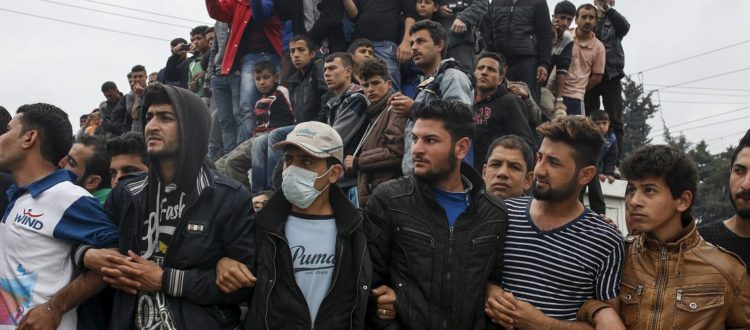Immigration Reform And Counter-Terrorism Are Intertwined
Published on July 18th, 2016
Migrants and refugees gather to listen to Nadia Murad Basee Taha (not pictured), an Iraqi woman of the Yazidi faith who was abducted and held by the Islamic State for three months, at the Greek-Macedonian border near the village of Idomeni, Greece, April 3, 2016. REUTERS/Marko Djurica.
By Douglas B. Baker
July 18, 2016
The Daily Caller
The headlines from Friday show yet another terror attack, again in France. A French national of Tunisian origin drove a truck laden with explosives into a crowd of celebrants, who had just seen a fireworks show highlighting France’s Independence Day. The attack is horrific and unsettling, and yet, also a grim reminder how important it is that immigrants culturally assimilate and adopt the values of the host country. As we unfortunately saw in San Bernardino and Orlando, these style attacks could continue in the United State unless our government takes affirmative steps and closes the immigration loop.
In the 2016 presidential campaign, the presumptive nominees of the two major parties hold decidedly different views on immigration reform. The Democratic candidate, Hillary Clinton, looks to double down on President Obama’s policy to legalize the approximately 11.5 million unauthorized immigrants estimated by the Pew Research Center to be living in the U.S. On the other side of the political spectrum, Donald Trump, the Republican candidate, has suggested we build a wall on the U.S.-Mexico border and temporarily ban all Muslims from entering the USA. The last recommendation is perhaps partially driven by the fact that the perpetrators in San Bernardino and Orlando were second generation Muslim-Americans.
Somewhere in between these candidates’ political positions is a sound balanced policy that is reminiscent of the proposal put forth by President Bush (43) which had five elements: (1) enhanced border security, (2) enhanced worksite compliance, (3) a temporary worker program, (4) a program that deals with the current population of illegal residents, and (5) programs to ensure assimilation into the fabric of American society.
Border security is a basic responsibility of any sovereign nation and is imperative for our national security. In 2005, when I worked at the White House, we were playing catch up after years of border security neglect. We saw the numbers of Border Patrol agents double from 9,000 to 18,000, greatly increased the use of physical barriers, and expanded the use of technology at the border. While there are still holes that need to be addressed, we now have the tools, if we can muster the will, to effectively control our borders.





